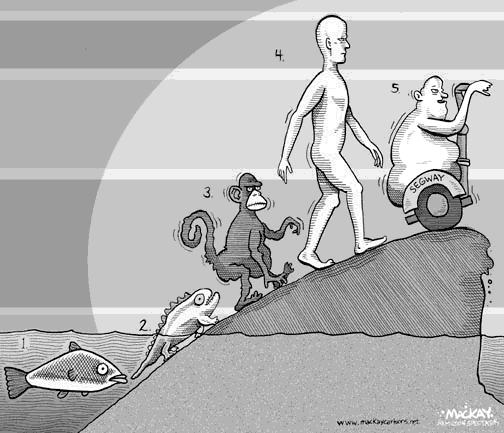Graeme MacKay is editorial cartoonist of the Hamilton Spectator newspaper, of
Hamilton, Ontario, Canada. His cartoon above, published on December 5, 2001, comments on
the unveiling of the Segway, a self-balancing, electrically powered scooter, to the tune
of an enormous media fanfare. MacKay's comments on the cartoon follow (from an e-mail
dated December 12, 2001):
Thanks for your email, John,
The old fish - amphibian - mammal - human - gag figure is an idea that I must admit is
overused by cartoonists. I've seen it done many times over regarding all kinds of
different issues. I'd say every cartoonist has a licence to use the fish to gag figure
idea but only once in his/her career. (I use this policy for other sorts of other
familliar overplayed things -- such as the arriving at the pearly gates idea which
cartoonists employ a great deal and which I used for the first, and last time recently,
when George Harrison died.)
I had a look at your site and I can tell you that I've seen a few other cartoons
similar to the covered bicycle one. I think there's one other evolution like one at the
Slate site which actually uses an SUV as the final gag figure.
Feel free to include my cartoon on your website. I only ask that you credit the cartoon
back to my own site www.mackaycartoons.net.
Thanks again for your email, John,
Best Regards,
Graeme MacKay
Editorial Cartoonist
The Hamilton Spectator
P.S. I look forward to seeing my first Segway in action. I'll probably laugh my head
off.
Note that the Segway in MacKay's cartoon is about to roll forward over a cliff and into
the water. MacKay apparently shares my (John Allen's) opinion of the Segway's commercial
potential.
Dean Kamen, developer of the Segway, has a different opinion. This is from an article
which appeared in Time Magazine:
With the Segway, Kamen plans to change the world by changing how cities are organized.
To Kamen's way of thinking, the problem is the automobile. "Cities
need cars like fish need bicycles," he says. Segways, he believes, are ideal
for downtown transportation. Unlike cars, they are cheap, clean, efficient, maneuverable.
Unlike bicycles, they are designed specifically to be pedestrian friendly. "A bike is
too slow and light to mix with trucks in the street but too large and fast to mix with
pedestrians on the sidewalk," he argues. "Our machine is compatible with the
sidewalk. If a Segway hits you, it's like being hit by another pedestrian." By
traveling at three or four times walking speed, and thus turning what would have been a
30-minute walk into a 10-minute ride, Kamen contends, Segways will in effect shrink cities
to the point where cars "will not only be undesirable, but unnecessary."
Kamen's opinions about bicycling are inaccurate, self-serving and derogatory; the claim
that a person on a 65-pound (20 kg) Segway traveling at 3 or 4 times the speed of a
pedestrian would be any less hazardous in pedestrian traffic than a person on a 30-pound
bicycle traveling at the same speed is bizarre. |

